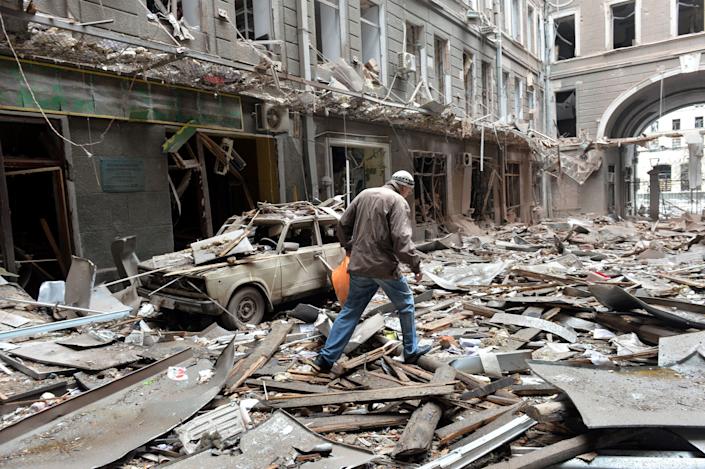USA TODAY Opinion asked U.S. Army Col. Yevgeny (Eugene) Vindman to give his assessment of developments in Ukraine’s war with Russia. Vindman, along with his twin brother, Alexander Vindman, served on the National Security Council during the Trump administration. They raised concerns about President Donald Trump’s phone call to Ukrainian President Volodymyr Zelenskyy in 2019; the brothers were later fired from the NSC.
“It’s hard for me to watch what (Vladimir) Putin is doing to those people and his own country,” Vindman said. “I also think about my mother’s grave in Kyiv and my other relatives buried there. Will I ever be able to visit their graves and lay flowers upon them? Will anything be left? I’m not sure.”
Opinions in your inbox: Get a digest of our takes on current events every day
Vindman spoke in his personal capacity. The views expressed are his own and not necessarily the view of the U.S. Army, the Department of Defense or the U.S. government. His conversation with USA TODAY Editorial Board members Tim Swarens and Austin Bogues has been edited for length and clarity:
Q. What is your overall assessment of where things now stand in the war? Is the most likely scenario still a Russian military victory, or have the facts on the ground changed to the point where Ukrainians have a realistic chance of repelling the invasion?
A. The war in Ukraine is entering a new, more deadly phase. Russian forces appear to be reverting to their old methodology of leveling cities and apparently indiscriminate bombing (see Aleppo, Syria, and Grozny, Chechnya). They are destroying many civilian areas and structures and attacking civilian facilities, including the largest nuclear power plant in Europe. The civilian death toll is likely to skyrocket. At the same time, Ukrainian forces are inflicting heavy casualties on Russian air and ground forces. Russia will not be able to sustain such casualties for very long.
In their own words: Ukrainians talk about living through Russian invasion
A Russian victory is not a foregone conclusion. Russian forces are underperforming, and Ukrainian forces are overperforming. Ukrainians’ will to fight is impressive, and they have proven themselves to be some of the most highly motivated and effective forces in the world, despite being under-gunned. This is in large part due to Zelenskyy’s leadership. Ukrainians have a legitimate chance to repel the invasion, but the cost in civilian casualties will be high.


Q. Reports indicate that Russian forces are using heavy firepower, including rockets and missiles, to attack Ukrainian cities. Have you seen evidence to suggest that Putin and Russian commanders may be guilty of war crimes? Or are we seeing the horrific but expected consequences of modern warfare when urban areas are involved?
A. There is evidence that Russian attacks are in violation of the laws of war. The four principles of the law of war are:
►Only attack targets out of military necessity or for a military objective.
►Discriminate between civilian and military targets.
►Proportionality – ensure that if you attack when civilian casualties are possible that you use only so much force as is necessary to achieve the military objective.
►Humanity – not using weapons to cause unnecessary injury or using lawful weapons in an unlawful manner.
The law of war, including the Geneva Conventions on protecting civilians and civilian objects, has specific prohibitions that Russian forces appear to be violating, including attacks that fail to distinguish between military and civilian targets. Russian forces have also used Ukrainian uniforms to gain surprise when attacking Ukrainian forces. That is prohibited.
Ukraine war diary:‘My 10-year-old son is now making camouflage nets for military’
These are all potential war crimes. They must all be documented to the greatest extent possible for future accountability. Finally, Russia withdrew from some of the Geneva Conventions’ additional protocols a few years ago. This withdrawal less constrains Russian operations in some ways. It may also indicate that Russia has been planning this war for some time.
Q. Do you see a likely scenario where Putin can now retreat and retain power? Or has he stumbled into a trap where he must keep fighting this war in an attempt to save his dictatorship and himself?
A. My personal opinion is that Putin’s days are numbered. Putin has attempted maximalist goals – conquer all of Ukraine and pacify the population. He will not achieve these goals. Putin is a strongman who is demonstrating that he is not very strong. His only leverage against the West is nuclear war. However, he cannot push the red button on his own. He requires many subordinates to execute his orders. They are not likely interested in a war of nuclear annihilation that Putin started for no reason. He is also afraid and isolated, as demonstrated by the distance he puts between himself and others at a table. It’s hard for me to believe that someone so scared is willing to die in a nuclear holocaust. Having said all this, the risks are high, and that is why the U.S. and the West are taking a measured and restrained approach. Creatively thinking about off-ramps and engaging intermediaries, like the Israelis, is the smart and rational approach.


Q. Your family has deep roots in Ukraine. What has it been like for you to watch this war unfold?
A. This war has been terrible to watch. I’ve been glued to one screen or another. Twitter has some really smart people who are scouring open-source intelligence, compiling it and providing excellent analysis. There is a fairly accurate picture of Russian casualties and material loss; those numbers are staggering. There is also a pretty good record of the Russian atrocities in the war, which will be necessary for accountability once this is over. Personally, I try to think about what I can do to help. The Ukrainians are fighting for Western values, freedom and democracy. My heart goes out to them, and I think the American people are united behind them. In a democracy, the people speak and politicians follow. If we support the Ukrainian people, then so will our governments. I was born in the Soviet Union. I speak Russian, not Ukrainian. It’s hard for me to watch what Putin is doing to those people and his own country. I also think about my mother’s grave in Kyiv and my other relatives buried there. Will I ever be able to visit their graves and lay flowers upon them? Will anything be left? I’m not sure.
Deputy opinion editor Tim Swarens and commentary editor Austin Bogues are members of USA TODAY’s Editorial Board.
You can read diverse opinions from our Board of Contributors and other writers on the Opinion front page, on Twitter @usatodayopinion and in our daily Opinion newsletter. To respond to a column, submit a comment to letters@usatoday.com.
This article originally appeared on USA TODAY: Russia’s war with Ukraine: Putin has shown he’s not very strong




